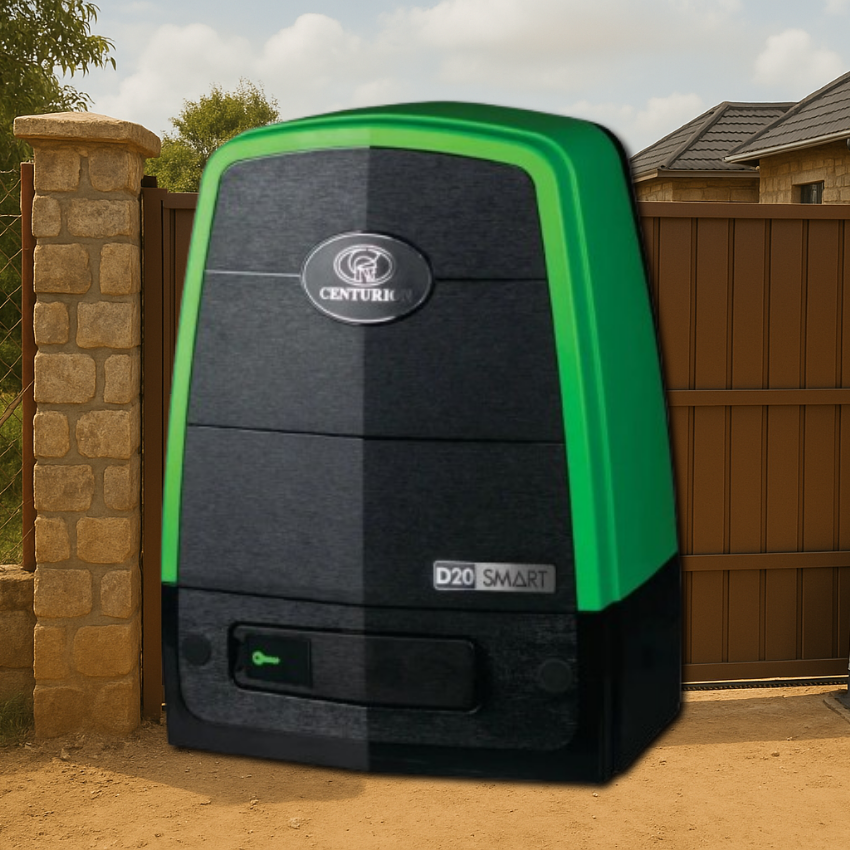
Introduction
Kenya’s sunny climate makes solar energy one of the most reliable and cost-effective power solutions for homes and businesses. When it comes to swing gate automation or sliding gate automation, a solar power kit provides independence from unreliable grid electricity, reduces energy costs, and ensures your gate system remains functional during blackouts.
Whether you live in an off-grid area, a rural farm, or even in Nairobi estates facing frequent power interruptions, investing in a solar-powered swing gate kit ensures convenience, security, and sustainability.
Why Choose a Solar Power Kit for Swing and Sliding Gates in Kenya?
-
Energy Independence – No need to rely solely on KPLC power supply.
-
Eco-Friendly Solution – Reduces carbon footprint by using renewable energy.
-
Cost Savings – No monthly electricity bills for powering your gate.
-
Uninterrupted Security – Works seamlessly during blackouts.
-
Ideal for Remote Areas – Perfect for farms, rural homes, and properties without stable electricity.
Components of a Solar Power Kit for Swing and Sliding Gates
A complete solar gate automation kit typically includes:
-
Solar Panels (200W – 250W depending on usage) – Capture sunlight and convert it to energy.
-
Charge Controller – Regulates the power flow from solar panels to the battery.
-
Deep Cycle Battery (12V/24V) – Stores solar energy for night and cloudy days.
- Automatic Swing or sliding Gate Motor Kit – Works with solar power for smooth gate operation.
How Solar Swing and Sliding Gate Kits Work in Kenya
-
The solar panel absorbs sunlight and generates electricity.
-
The charge controller manages the power going into the battery.
-
The battery stores power for use at night or during cloudy days.
-
The swing or sliding gate motors uses stored energy to open/close gates when triggered by a remote control, keypad, or intercom system.
This system ensures your gate is always operational, even when grid power fails.
Pricing of Solar Power Kits for Swing and Sliding Gates in Kenya
The cost of a solar-powered swing gate kit in Kenya depends on the gate size, motor strength, and battery capacity.
-
Basic Kit (suitable for small residential gates): From KSh 60,000– KSh 80,000
-
Medium Kit (for estates & standard steel gates): From KSh 120,000 – KSh 160,000
-
Heavy-Duty Kit (for large gates & commercial use): From KSh 160,000 – KSh 250,000
Note: Prices vary depending on the motor type (single/dual), solar panel wattage, and installation requirements.
Advantages of Solar Swing and Sliding Gate Systems in Kenya
-
No Power Bills – 100% free energy from the sun.
-
Low Maintenance – Minimal servicing required.
-
Durability – Solar panels last 20+ years with proper care.
-
Security – Ensures gate automation 24/7.
-
Flexibility – Can be used in homes, farms, schools, and businesses.
Ideal Applications
-
Residential Homes
-
Gated Communities & Estates
-
Rural Farms & Ranches
-
Commercial Premises
-
Schools & Hospitals in remote areas
Client Feedback
“We installed a solar swing gate kit at our rural home in Kitengela, and it has worked perfectly even during long power outages. The convenience and security are unmatched.” – James K., Nairobi
“Our farm in Naivasha had no stable electricity supply, but with a solar-powered gate, we now enjoy reliable access control 24/7.” – Mary W., Naivasha
Where to Buy Solar Power Kits for Swing Gates in Kenya
If you’re looking for professional supply and installation of solar gate automation kits in Kenya, contact us today:
www.automaticgates.co.ke
www.home-automation.co.ke
Call | Text | WhatsApp: 0722 708034 / 0720 456534
Email: info@automaticgates.co.ke
FAQs
1. How long does a solar swing gate battery last?
A deep cycle battery can last 3–5 years depending on usage and maintenance.
2. Can a solar gate system work during rainy or cloudy days?
Yes. The battery stores energy, ensuring your gate operates even without direct sunlight.
3. Is solar gate automation suitable for heavy steel gates?
Yes. With the right motor size (like Centurion Vantage or R series), solar kits can handle heavy-duty gates.
4. How much maintenance is required?
Minimal – just clean solar panels occasionally and service the motor annually.
5. Can I upgrade an existing gate to solar power?
Yes. Any electric swing gate can be retrofitted with a solar kit.
6. What warranty do solar kits come with?
Most systems include a 1–2 year warranty on motors and 20+ years lifespan for solar panels.
Conclusion
A Solar Power Kit for Swing Gates in Kenya is not only a sustainable investment but also a practical solution for enhancing security and convenience. With zero electricity bills, reliable performance during power cuts, and suitability for both rural and urban properties, it’s the ultimate choice for anyone seeking eco-friendly gate automation.
www.automaticgates.co.ke
www.home-automation.co.ke
Call | Text | WhatsApp: 0722 708034 / 0720 456534
Email: info@automaticgates.co.ke
Grid-Powered vs Solar-Powered Gate Automation in Kenya – Which is Best?
Automatic gates have become increasingly popular in Kenya for homes, estates, farms, and businesses. They provide convenience, security, and modern access control. But when it comes to powering your gate, the big question is: should you choose a grid-powered or solar-powered system?
Both options have their advantages and disadvantages. This article compares grid-powered vs solar-powered gate automation in Kenya to help you make the right decision based on your location, budget, and lifestyle.
What is Grid-Powered Gate Automation?
Grid-powered gate automation relies on Kenya Power (KPLC) electricity to operate swing or sliding gate motors.
Pros
-
Stable Power Supply (in urban areas) – Reliable when electricity is consistent.
-
Lower Initial Cost – No need to buy solar panels or batteries.
-
Supports Heavy-Duty Gates – Works well with large motors for commercial/industrial gates.
Cons
-
Power Outages – Frequent blackouts in Kenya can render your gate unusable.
-
Monthly Electricity Bills – Adds to your utility costs.
-
Not Ideal for Remote Areas – Useless where there is no grid connection.
What is Solar-Powered Gate Automation?
A solar-powered gate system uses solar panels, a battery, and a charge controller to run your gate motor independently of the national grid.
Pros
-
Energy Independence – Works even during blackouts.
-
Eco-Friendly – Uses clean renewable energy.
-
No Bills – Free power from the sun.
-
Ideal for Remote Areas – Perfect for farms and rural homes.
-
Expandable – Can be combined with existing grid power as backup.
Cons
-
Higher Initial Investment – Cost of solar panels and batteries.
-
Battery Replacement – Batteries need replacing every 3–5 years.
-
Weather Dependent – Performance may reduce during long rainy seasons (though batteries store power).
Cost Comparison in Kenya
| Feature | Grid-Powered Gate | Solar-Powered Gate |
|---|---|---|
| Initial Cost | KSh 110,000 – 200,000 | KSh 165,000 – 250,000 |
| Running Cost | Monthly electricity bills | Zero bills (only battery replacement) |
| Reliability | Depends on KPLC | Works 24/7 with stored solar energy |
| Best For | Urban areas with stable power | Rural/remote areas or eco-friendly homes |
Which One Should You Choose?
-
Choose Grid-Powered if you live in Nairobi, Mombasa, Kisumu, Nakuru, or urban towns where power is stable and want a lower upfront cost.
-
Choose Solar-Powered if you live in remote or rural areas, want to save on long-term costs, or need your gate to remain functional during frequent blackouts.
For many Kenyans, a hybrid system (solar + grid backup) is the best choice – ensuring uninterrupted gate operation.
Expert Recommendation
If your property is in Nairobi estates with good electricity supply, a grid-powered system is affordable and reliable. However, if you are in areas like Kitengela, Kajiado, Naivasha, Nanyuki, Machakos, or rural counties, a solar-powered gate kit is the smarter option.
Conclusion
Both grid-powered and solar-powered gate automation systems in Kenya offer convenience and security, but the right choice depends on your needs:
-
Grid Power: Cheaper upfront, but affected by blackouts.
-
Solar Power: Higher initial cost, but cheaper long-term and reliable everywhere.
For professional supply and installation of both grid-powered and solar-powered gate automation in Kenya, contact us today:
www.automaticgates.co.ke
www.home-automation.co.ke
Call | Text | WhatsApp: 0722 708034 / 0720 456534
Email: info@automaticgates.co.ke
Grid vs Solar vs Hybrid Gate Automation in Kenya
| Feature | Grid Power System | Solar Power System | Hybrid System (Grid + Solar) |
|---|---|---|---|
| Power Source | KPLC electricity only | Solar panels + battery | Both KPLC & Solar |
| Reliability | Affected by blackouts | Affected by cloudy/rainy days | Always reliable – automatic switching |
| Cost | Lower initial cost | Higher upfront investment | Medium to high initial cost |
| Running Costs | Monthly electricity bills | Free solar energy | Reduced bills (solar + occasional grid use) |
| Best For | Urban areas with stable power | Remote/off-grid areas | Homes, farms, estates, businesses |
| Gate Types Supported | Swing & sliding (light–medium duty) | Swing & sliding (light–medium duty) | Swing, sliding & heavy-duty industrial gates |
| Eco-Friendly | Not eco-friendly | 100% green | Reduced carbon footprint |
| Lifespan of System | 7–10 years with maintenance | 10–15 years with proper care | 10–15 years with dual protection |
Conclusion:
-
If you live in urban areas with stable KPLC power, grid systems are affordable and effective.
-
If you are in a remote/off-grid area, solar systems are your best choice.
-
For maximum reliability, cost savings, and flexibility, the hybrid system is the ultimate solution.
continue reading
Related Posts
Gate automation in Kenya is becoming increasingly popular as homeowners, [...]
Automatic gates are no longer a luxury reserved for high-end [...]



